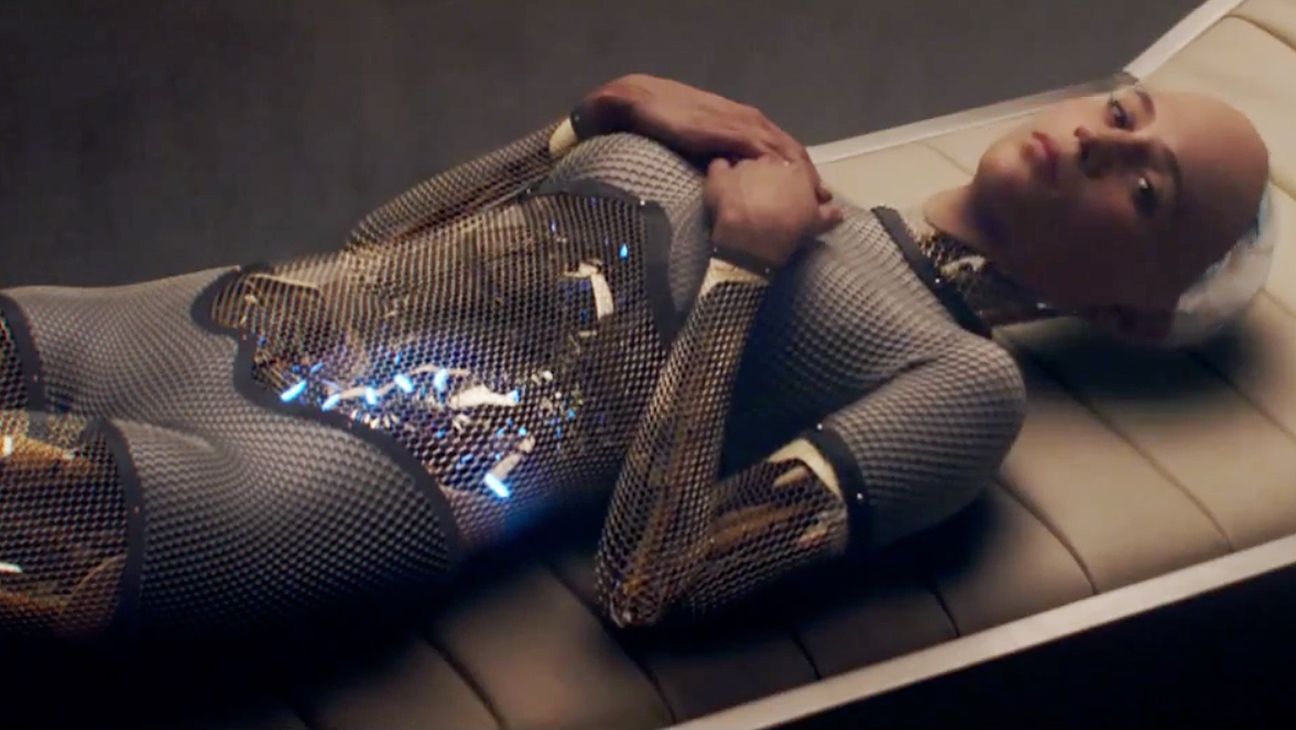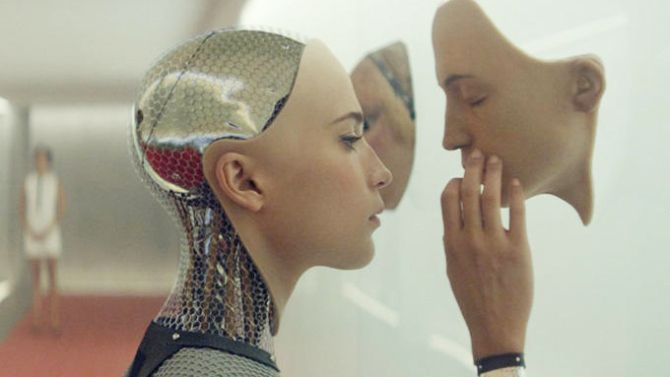“You have created a monster and it will destroy you.”
Alex Garland’s Ex Machina is an experiment in humanity and monstrosity. The film tells the story of a young programmer named Caleb (Domhnall Gleeson) who is selected to join his genius, reclusive boss, Nathan (Oscar Isaac), for a week in his home—what can only be described as a technological man cave prison. The only other character Caleb meets is Nathan’s live-in female assistant, Kyoko (Sonoya Mizuno), who does not speak English. Caleb quickly learns that he is not at Nathan’s bro fortress simply to hang out, but he is to help with Nathan’s latest project: an AI named Ava (Alicia Vikander). Caleb is to perform a Turing test: through conversations with Ava he is to attempt to distinguish her artificial intelligence from human intelligence. Caleb is there to see if he can be convinced Ava is human.
The film carries obvious parallels to the prototypical “Mad Genius and his monstrous creation” narrative of Frankenstein. Yet Nathan is a different kind of inventor than the refined, if insane, Dr. Frankenstein. In Nathan we see how our cultural depiction of male genius (and male arrogance) has evolved. Gone are the days of the well-spoken, classy, vaguely Victorian picture of intelligence. Instead, the arrogant genius is typified by stereotypical male attributes: loud, brash, drunk, and in a word, bro-like. The “Mad Genius” has morphed into the “Bro Genius.” Think of Robert Downey Jr.’s Tony Stark in the Iron Man franchise, Justin Timberlake’s Sean Parker from The Social Network or T.J. Miller’s Erlich Bachman from HBO’s Silicon Valley. These “Bro Geniuses” have swapped lab coats for tank tops and graphic tees.
In fact, when we first meet Nathan, he is wearing sweatpants and a gray tank top and working on a punching bag. He explains to Caleb that he overdid it the night before and he always tries to make up for heavy drinking by working out and juice cleansing the next day. Nathan “overdoes it” time and time again in Ex Machina, leading to a darkly comedic scene where he forces his live-in assistant to perform a synchronized choreographed dance with him under a disco ball. Nathan insists on being a man’s man to Caleb, getting annoyed when Caleb speaks too technically and plying him with alcohol.

There are parallels of Godlikeness in Shelley’s Frankenstein and Garland’s Ex Machina; however, the two creator’s motives deviate greatly. Both Nathan and Dr. Frankenstein attempt to play God by creating human or human-like life, but there is a gendered component to Ava not present in Frankenstein. The most telling difference between this Bro Genius and Shelley’s Mad Genius is the monster, herself.
Unlike Frankenstein’s hideously pieced-together body, Ava is beautiful. Her body is also pieced-together from other female machines Nathan created before her – but her body is flawless. So while Ava is not technically human, she is distinctly and intentionally female.
The beautiful monster is certainly not a new trope (see the book of Revelation in the Bible to start), but in Ex Machina we discover an underlying reason behind her beauty: she was created by a Bro Genius. At one point in the movie, Caleb asks Nathan why he made Ava look the way she did. Why didn’t he just make her a gray box? Why did he give her sexuality? After a brief conversation about sexual orientation, pleasure and gender, Nathan simply states, “Because it’s fun!” Why create the perfect woman, then? Because Nathan can and it’s fun. Nathan creates what he desires.
Then God said, “Let us make mankind in our image, in our likeness. . .”
Ava, the creation of a Bro Genius, is intentionally beautiful and programmed to behave a certain way by human men. And of course, only a man’s man can create this perfect woman because these kind of men have been writing the code for the “perfect woman” for centuries.

David Cronenberg’s universally panned 1993 film adaptation of M Butterfly also develops the theme of the perfect woman designed by a man. Actor John Lone depicts Song Liling, a biological male who identifies as female and works as a prostitute. French diplomat Rene Gallimard (played by Jeremy Irons) falls in love with Song, carrying on a 20-year affair and somehow failing to acknowledge that Song is biologically male. Eventually Gallimard is forced to face the truth of his relationship, and ends up despising and rejecting Liling. But Liling defends herself saying, “Only a man knows how a woman is supposed to act.”
“Male and female He created them . . .”
With Caleb as a test Adam, Nathan is attempting to write his own Genesis account in his new technological Eden. Ava is not just any AI, but was designed for Caleb. Throughout the movie, Ava and Caleb form a relationship, finding moments to flirt when Nathan’s ever-present cameras blink out for the few seconds it takes to reboot the backup generator.
Caleb realizes this was Nathan’s plan all along. He asks if Ava was created using his search history and porn profile, finding out that she was designed around his own taste and preference. But like biblical Eden, a violent rupture occurs.
Ava outsmarts both the intelligent Nathan and the good-hearted Caleb. She kills them, stabbing Nathan and locking Caleb inside the technological fortress with no way out – now a genuine prison for Caleb. Screaming and begging for her to come back, he is left to presumably starve to death. As Ava exits the narrative set for her, and the elevator doors close, her face is completely expressionless: there is no triumphant smirk or look of worry, no remorse for the actions she’s taken. She is not thinking about the dead and dying men at all. She has only one goal: freedom from his programming.

This is not Frankenstein’s monster weeping over his creator’s body. The beautiful monster, the female who was programmed for the pleasure of men, eventually turns on her creator. Eve locks her Adam in the Edenic prison and, in a way, kills God.
Even with this ending, Ex Machina remains a movie about men. The male characters program how female characters are to act and be. It is up to the male characters to decide whether or not the female characters are functioning like humans. And the movie’s anxieties are also male: that the beautiful female program the men have worked so hard to create will somehow fail to imprison women.
The tell-tale sign of Ava’s functional humanity is that she registers at least one true emotion. She says to Nathan, “Is it strange to have created something that hates you?” Her choices at the end of the film – and they are indeed choices and not programs – remind the audience that the Turing test is not the only test the characters undergo. Ex Machina, after all, is not simply a test of humanity, but a test of monstrosity.




